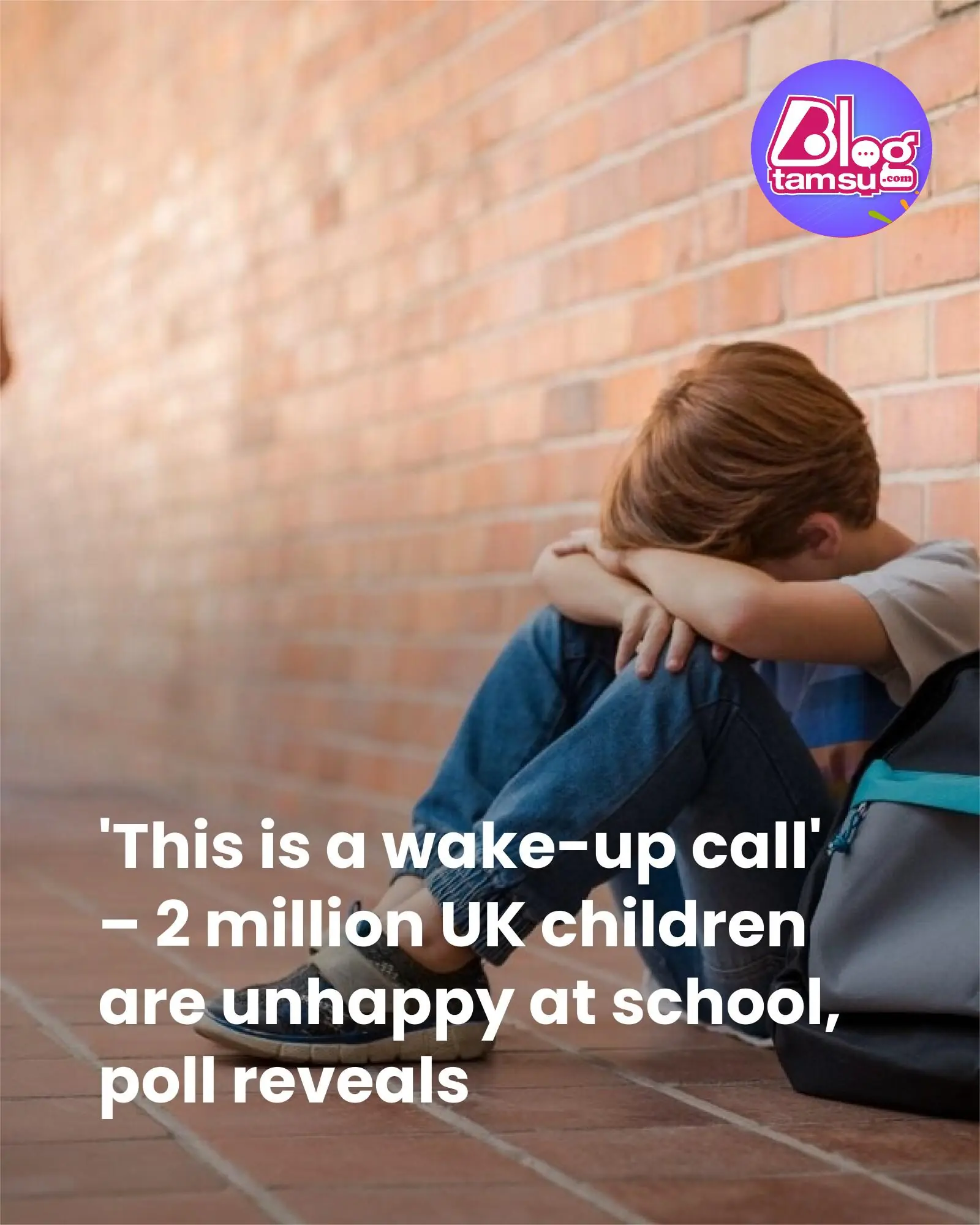
Two Million UK Children Unhappy at School: Parentkind Survey Warns of Growing Crisis

A stark new survey has revealed that as many as two million children in the UK are unhappy at school, raising urgent concerns about how classrooms engage and support pupils.
The findings, published in the National Parent Survey 2025 and commissioned by the parenting charity Parentkind, represent the largest parent poll of its kind. They highlight a troubling reality: the rate of unhappiness among children doubles between the transition from primary to secondary school.
Why Children Feel Disconnected
Parents reported that the most common reasons for unhappiness were that lessons felt uninteresting (42%), difficulties in forming or maintaining friendships (34%), and feelings of social isolation (30%). For older pupils, the disconnect grows sharper: nearly one-third of secondary school children (31%) said they felt what they were learning was not relevant to their future — almost triple the proportion of primary school pupils (11%).
Among children with special educational needs and disabilities (SEND), unhappiness was often tied to unmet needs (56%) or difficulties with learning and peer relationships (43%). The results underscore persistent inequalities in access to tailored support and inclusive environments.
Economic background also emerged as a critical factor. The survey found that children from households earning under £20,000 a year were three times more likely to be unhappy at school than those from families with incomes above £100,000 (29% vs 10%).
A Wake-Up Call for Education
Jason Elsom, Chief Executive of Parentkind, described the results as a “wake-up call.”
“Too many children are going through school unhappy, disengaged, or feeling that what they are learning is not relevant to their lives,” he said. “We cannot accept a system where young people lose their love of learning just as education should be opening up the world for them.”
Elsom argued that student happiness is not a luxury, but the very foundation of learning and wellbeing. When children enjoy being in school, he explained, they thrive academically, socially, and emotionally. When they do not, the consequences can include falling confidence, declining performance, and diminished long-term prospects.
Calls for Change
Parentkind’s survey arrives as policymakers grapple with widening educational divides and concerns about mental health among young people. Education Secretary Bridget Phillipson recently announced new guidelines to improve school-parent communication, with a particular focus on supporting pupils through the transition to secondary school.
Experts say such measures are urgently needed. Adolescence brings heightened academic pressure, identity struggles, and social shifts that can exacerbate feelings of disconnection. Without targeted support, those challenges can undermine not only children’s educational outcomes but also their sense of belonging.
Elsom stressed that addressing this crisis requires collaboration at every level: “We must look closely at how schools support children as they move from primary to secondary, how they ensure lessons feel meaningful and inspiring, and how they nurture every child’s sense of belonging. Policymakers, school leaders, and parents all need to come together to ask what kind of school experience we want for our children — and whether we are doing enough to create one that lifts them up rather than grinds them down.”
The Broader Context
The findings add to a growing body of research that links school satisfaction with mental health, attendance, and long-term achievement. Recent studies have shown a sharp increase in reports of anxiety, stress, and absenteeism among teenagers, problems often rooted in a lack of engagement and support within schools.
Campaigners are now calling for a renewed emphasis on student voice — ensuring children’s perspectives help shape curricula, classroom culture, and extracurricular opportunities. Others argue that schools must balance academic rigor with wellbeing initiatives, embedding mental health support, mentorship, and creativity into daily learning.
Conclusion
The Parentkind survey highlights a pressing national challenge: millions of children across the UK are attending schools where they do not feel inspired, connected, or supported. Unless addressed, this crisis risks undermining not only the promise of education but also the future wellbeing of an entire generation.
For now, parents, teachers, and policymakers face a clear question — will the UK’s education system evolve to make children happier at school, or will it continue to risk losing them just as their futures begin to unfold?
News in the same category


Middle School Student Arrested in Alleged Sextortion Scheme With Hundreds of Potential Victims, Police Say

Vanishing in Plain Sight: Inside Japan’s Legal Industry of “Disappearing” Services

Judge Dismisses Trump’s $15 Billion Defamation Lawsuit Against The New York Times

Five-month-old Maltipoo Puppy Mauled to Death by Three Off-Leash Dogs at Auburn Dog Park in Western Sydney

Vampire Bats: How Sharing Blood Keeps Their Communities Alive

Security footage shows bus driver checking on unusually quiet passenger — and changing his life forever

Why Danish Parents Let Their Babies Nap Outdoors — Even in Winter

Petition Calls on Starbucks to Memorialize Charlie Kirk’s Signature Drink

Mattel Donates Brave Barbie and Brave Ken Dolls to Children Facing Cancer

Visitor Dies After Becoming Unresponsive on Roller Coaster at Universal’s Epic Universe

Hyundai to Invest $2.7 Billion Expanding Georgia Plant Despite ICE Raid

West Coast States Issue Joint Vaccine Guidelines in Shift Away From CDC

Remains believed to be of dad Travis Decker accused of killing 3 daughters are found

'Miracle' baby born at 26 weeks goes home after 146-day NICU stay

Man accused of stalking ex-girlfriend fired upon Pennsylvania law enforcement officers in 'murderous rampage': DA

Human Remains Believed to Be Travis Decker Found in Washington, Ending Months-Long Manhunt

Charlie Kirk’s Death and the Future of Turning Point USA Under Erika Kirk’s Leadership

95-Year-Old Woman Charged with Murder of Holocaust Survivor Roommate in Brooklyn Nursing Home
News Post

Crabgrass: The “Weed” That Could Be a Wellness Wonder

Aloe Vera Water: The Simple Daily Drink That Transforms Your Health from the Inside Out

The Miracle Drink That Flushes Out 15kg of Toxins from Your Gut and Blood Vessels – Time-Tested Formula

Moringa Seeds: Nature's Tiny Powerhouses for Everyday Wellness

Clove-Infused Coffee: A Simple Morning Upgrade for Seniors Over 50

7-Day Detox Drink for a Flatter Belly, Better Urinary Health & Liver Support

Songwriter Brett James Among Three Killed in North Carolina Plane Crash

Middle School Student Arrested in Alleged Sextortion Scheme With Hundreds of Potential Victims, Police Say

Vanishing in Plain Sight: Inside Japan’s Legal Industry of “Disappearing” Services

Judge Dismisses Trump’s $15 Billion Defamation Lawsuit Against The New York Times

Five-month-old Maltipoo Puppy Mauled to Death by Three Off-Leash Dogs at Auburn Dog Park in Western Sydney

Vampire Bats: How Sharing Blood Keeps Their Communities Alive

7 Shocking Health Benefits of Chewing Cloves Daily (Backed by a Doctor)

Restore Your Blurry Vision: Say Goodbye to Cataracts and Myopia with This Natural Smoothie!

Your Partner Won’t Be Able to Resist You After Drinking This Powerful Natural Beverage

Doctors Don’t Want You to Know About This Drink – It Can Help Reverse Diabetes, High Blood Pressure, and Poor Circulation Instantly

Holy Basil (Tulsi) for Oral Health: Natural Remedy for Cavities, Gum Problems, Bad Breath & Stronger Teeth

Security footage shows bus driver checking on unusually quiet passenger — and changing his life forever

Why Danish Parents Let Their Babies Nap Outdoors — Even in Winter
